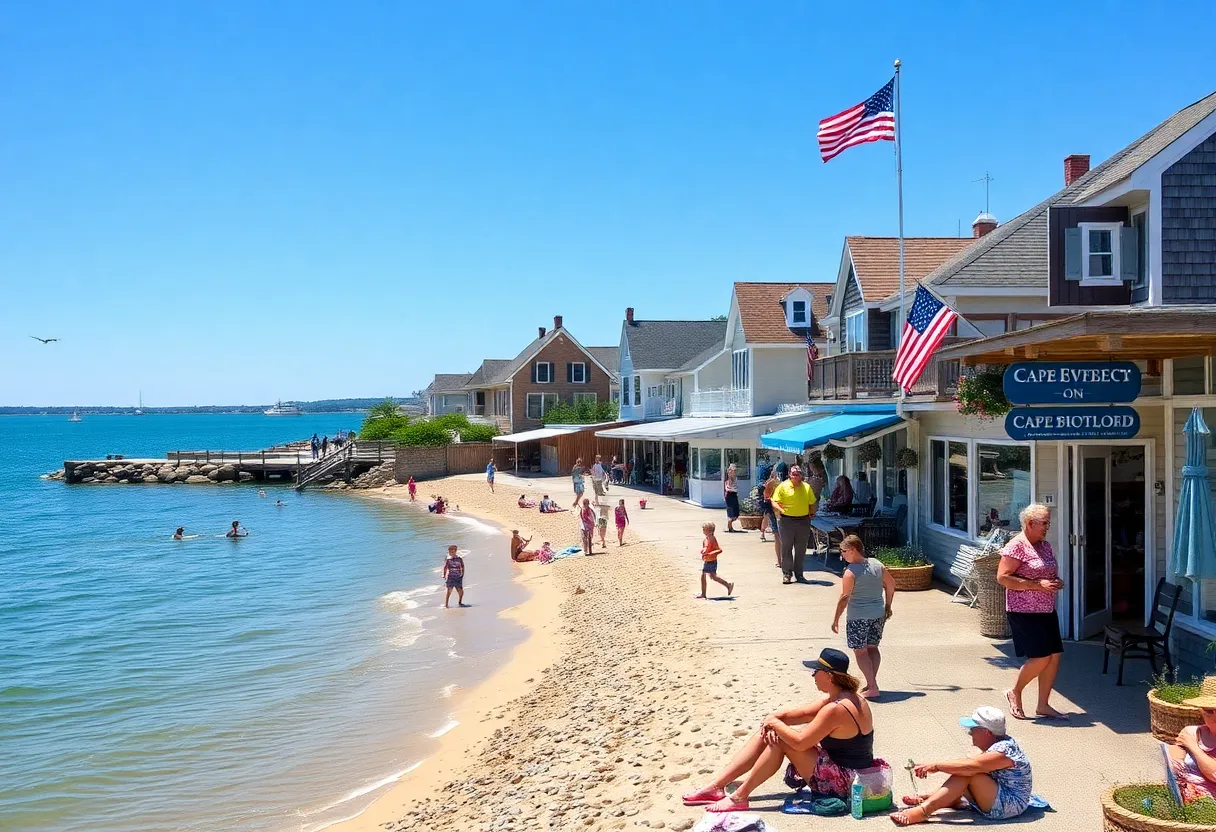Massachusetts, September 19, 2025
News Summary
Massachusetts business leaders are facing an uncertain economic outlook as tourism struggles and federal policy pressures affect key sectors. Reports indicate declines in peak-season visits, particularly on Cape Cod, where tourism plays a critical role in supporting local businesses. Concerns over healthcare sector stability, rising unemployment, and consumer confidence-related declines fuel worries about the broader economic landscape. Proposed funding changes aim to stabilize tourism revenues amidst these challenges.
Boston — Massachusetts business leaders are preparing for an uncertain economic period as tourism shows signs of strain and federal policy pressures threaten core sectors, with state officials and industry representatives outlining risks and potential stabilizers.
Key developments and immediate concerns
Tourism weakness and shifting demand are contributing to short-term economic headwinds across the state, with local leaders reporting declines in peak-season visits and changing patterns among international travelers. In 2023, visitors spent $23.6 billion in Massachusetts, creating over 154,000 jobs and contributing $2.3 billion in state and local taxes. At the regional level, Cape Cod saw direct visitor spending of $2.7 billion with over 14,000 tourism-related jobs and $163 million in state and local taxes collected.
Industry data show visitor-driven revenues account for large shares of local business income on Cape Cod: Nearly 45% of restaurant revenues on Cape Cod came from visitors, while visitor spending accounted for significant revenue shares in retail (36%) and local businesses (47%). Despite a steady level of hotel occupancy reported in 2024, the lodging market is changing: Hotel occupancy remained steady in 2024 but with a decreased average length of stay and a decline in the short-term rental market, leading to price cuts by 32% of vacation rental owners.
Leaders’ assessments and sector responses
Greater Boston Chamber of Commerce leadership described a difficult period for the hotel industry earlier in the cycle but also pointed to potential recovery catalysts. Rooney notes the hotel industry faced a tough first half of 2023 but expresses hope for a rebound linked to major upcoming events like the country’s 250th anniversary in 2026, the World Cup, and tall ships. At the same time, state and regional leaders emphasize that recovery need not depend solely on major events because He emphasizes that despite the possibility of major events, Massachusetts’ economy can still recover driven by its strong healthcare sector.
Officials underscored the size and stabilizing role of health-related institutions in the state economy. Rooney highlights the health care sector’s role in generating economic growth, employing a million people across the state through colleges, universities, and hospitals. Those same institutions have flagged risks tied to research funding stability, noting that Concerns from these institutions focus on the discontinuity in science and research funding, indicating that research cannot be paused and resumed easily.
Regional leaders and proposed funding changes
At a Travel and Tourism Forum, the state’s tourism director recognized a private company for its contributions to the sector: Kate Fox, executive director of the state’s Office of Travel and Tourism, praised Cape Cod Commercial Linen Service for its significant contribution to the tourism sector. Local chamber leaders cited consumer confidence and inflation as factors behind recent declines in summer visitation, with Paul Niedzwiecki, CEO of the Cape Cod Chamber of Commerce, attributes declines in tourism in July and August 2025 to lower consumer confidence and inflation affecting discretionary income.
To address funding gaps, Proposed bills in the Massachusetts legislature seek to boost funding for travel and tourism; current state appropriations remain limited: The state allocates $10 million annually, with only $6 million directed to regional tourism councils. In one regional initiative intended to create ongoing marketing funds, Niedzwiecki filed a petition to establish a Tourism Destination Marketing District in Yarmouth to create a self-sustaining revenue source for tourism marketing through hotel assessments. Industry representatives at the regional and city levels indicated that such district models could materially improve long-term marketing capacity; Dave O’Donnell of Meet Boston said creation of Tourism Destination Marketing Districts could be transformative for financial sustainability in tourism.
Broader economic risks and background context
Beyond tourism, leaders warned that Massachusetts faces wider headwinds tied to federal policy and international economic trends. The state’s core sectors, particularly education, healthcare and clean energy, confront uncertainty from shifting federal priorities and potential budget pressures. The clean energy sector is also experiencing challenges due to federal policy uncertainty, leading to fears of disrupted investments and project delays.
Economic indicators point to a cooling phase: The overall Massachusetts economy saw a contraction of 1.1% in the first quarter of the year, with rising unemployment rates and increased hesitancy in long-term investments among businesses. National-level forecasts highlight downside risks as well, with one assessment noting that Massachusetts could potentially lose 100,000 jobs by 2026 if the U.S. economy enters a recession, as forecasted by economic experts.
International visitation trends add to the uncertainty: Canadian visitors, the largest international group to Cape Cod, are reportedly looking elsewhere for vacation destinations, with a Leger survey indicating a 59% likelihood of reduced visits to the U.S. in 2025. Industry leaders said deteriorating international relations and broader economic uncertainty have contributed to a sharp decline in incoming tourism and business travel to the U.S.
What leaders say they will do next
State and regional officials are monitoring spending patterns, legislative proposals, and marketing tools aimed at stabilizing tourism revenues. Local chambers and tourism offices plan to pursue funding changes, district-based marketing models, and targeted campaigns while relying on the healthcare sector and higher education institutions to cushion near-term economic volatility.
FAQ
Q: How much did visitors spend in Massachusetts in 2023?
A: In 2023, visitors spent $23.6 billion in Massachusetts, creating over 154,000 jobs and contributing $2.3 billion in state and local taxes.
Q: What were the tourism figures for Cape Cod?
A: Cape Cod saw direct visitor spending of $2.7 billion with over 14,000 tourism-related jobs and $163 million in state and local taxes collected.
Q: How significant is visitor spending to Cape Cod businesses?
A: Nearly 45% of restaurant revenues on Cape Cod came from visitors, while visitor spending accounted for significant revenue shares in retail (36%) and local businesses (47%).
Q: What has happened in the lodging market?
A: Hotel occupancy remained steady in 2024 but with a decreased average length of stay and a decline in the short-term rental market, leading to price cuts by 32% of vacation rental owners.
Q: Are Canadian visitors still coming to Cape Cod?
A: Canadian visitors, the largest international group to Cape Cod, are reportedly looking elsewhere for vacation destinations, with a Leger survey indicating a 59% likelihood of reduced visits to the U.S. in 2025.
Q: What is the current state of the Massachusetts economy?
A: The overall Massachusetts economy saw a contraction of 1.1% in the first quarter of the year, with rising unemployment rates and increased hesitancy in long-term investments among businesses.
Q: How many jobs could the state lose in a U.S. recession?
A: Massachusetts could potentially lose 100,000 jobs by 2026 if the U.S. economy enters a recession, as forecasted by economic experts.
Q: How much does the state allocate for travel and tourism?
A: The state allocates $10 million annually, with only $6 million directed to regional tourism councils.
Q: What local initiative was filed to support tourism marketing?
A: Niedzwiecki filed a petition to establish a Tourism Destination Marketing District in Yarmouth to create a self-sustaining revenue source for tourism marketing through hotel assessments.
Q: What did local leaders say about the hotel industry’s outlook?
A: Rooney notes the hotel industry faced a tough first half of 2023 but expresses hope for a rebound linked to major upcoming events like the country’s 250th anniversary in 2026, the World Cup, and tall ships.
Q: What role does healthcare play in the state’s recovery?
A: He emphasizes that despite the possibility of major events, Massachusetts’ economy can still recover driven by its strong healthcare sector.
Q: How large is the health care workforce in Massachusetts?
A: Rooney highlights the health care sector’s role in generating economic growth, employing a million people across the state through colleges, universities, and hospitals.
Q: What funding concern did institutions raise?
A: Concerns from these institutions focus on the discontinuity in science and research funding, indicating that research cannot be paused and resumed easily.
Q: What challenges face the clean energy sector?
A: The clean energy sector is also experiencing challenges due to federal policy uncertainty, leading to fears of disrupted investments and project delays.
Q: Who was recognized at the Travel and Tourism Forum?
A: Kate Fox, executive director of the state’s Office of Travel and Tourism, praised Cape Cod Commercial Linen Service for its significant contribution to the tourism sector.
Q: What did the Cape Cod Chamber say about recent visitation declines?
A: Paul Niedzwiecki, CEO of the Cape Cod Chamber of Commerce, attributes declines in tourism in July and August 2025 to lower consumer confidence and inflation affecting discretionary income.
Q: What did a Meet Boston executive say about destination marketing districts?
A: Dave O’Donnell of Meet Boston said creation of Tourism Destination Marketing Districts could be transformative for financial sustainability in tourism.
Quick reference table
| Metric | Value | Scope |
|---|---|---|
| Visitor spending (2023) | $23.6 billion | Massachusetts |
| Jobs supported by visitors (2023) | Over 154,000 | Massachusetts |
| State and local taxes from visitors (2023) | $2.3 billion | Massachusetts |
| Cape Cod direct visitor spending | $2.7 billion | Cape Cod |
| Cape Cod tourism jobs | Over 14,000 | Cape Cod |
| Cape Cod state and local taxes | $163 million | Cape Cod |
| Restaurant revenue from visitors | Nearly 45% | Cape Cod |
| Retail revenue from visitors | 36% | Cape Cod |
| Local business revenue from visitors | 47% | Cape Cod |
| Vacation rental owners cutting prices | 32% | Cape Cod / statewide short-term rental market |
| State tourism budget | $10 million annually (with $6 million to regional councils) | Massachusetts |
| Q1 economic contraction | 1.1% | Massachusetts |
| Potential job losses in recession scenario | 100,000 by 2026 | Massachusetts |
| Leger survey on Canadian visitors (likelihood to reduce visits) | 59% | Nationwide (U.S. visits) |
Deeper Dive: News & Info About This Topic
HERE Resources
Massachusetts Advocates for Agricultural Resilience Legislation
Niche Releases 2026 College Rankings Based on Political Climate
Fall Festivals and Community Events Planned in Boston
Welsh Businesses Offered Funded Trip to MIT Conference
September Events Illuminate North Shore Culture
Small Business Confidence Declines Heading into Final Quarter
Downtown Boston Faces Economic Revival Challenges
Governor Healey Criticizes Federal Immigration Crackdown
Boston Initiates Inflatable Nightclubs for Community Nightlife
Former Boston City Councilor Sentenced for Kickback Scheme
Additional Resources
- Cape Cod Times: Cape Cod Hyannis Travel Tourism Marketing
- Skift: Global Destinations Shift from Mass Ads
- Travel and Tour World: Thailand’s Tourism Growth Soars
- MassLive: Business Travel to the U.S. Tanking
- Eco-Business: Mass Tourism Brings Dollars
- Wikipedia: Tourism in the United States
- Google Search: Tourism in Massachusetts
- Google Scholar: Massachusetts tourism economy
- Encyclopedia Britannica: Massachusetts
- Google News: Massachusetts tourism 2025

Author: STAFF HERE BOSTON WRITER
The BOSTON STAFF WRITER represents the experienced team at HEREBoston.com, your go-to source for actionable local news and information in Boston, Suffolk County, and beyond. Specializing in "news you can use," we cover essential topics like product reviews for personal and business needs, local business directories, politics, real estate trends, neighborhood insights, and state news affecting the area—with deep expertise drawn from years of dedicated reporting and strong community input, including local press releases and business updates. We deliver top reporting on high-value events such as Boston Marathon, Head of the Charles Regatta, and Boston Harborfest. Our coverage extends to key organizations like the Greater Boston Chamber of Commerce and Associated Industries of Massachusetts, plus leading businesses in finance, biotech, and insurance that power the local economy such as Fidelity Investments, Biogen, and Liberty Mutual Insurance. As part of the broader HERE network, we provide comprehensive, credible insights into Massachusetts's dynamic landscape.





